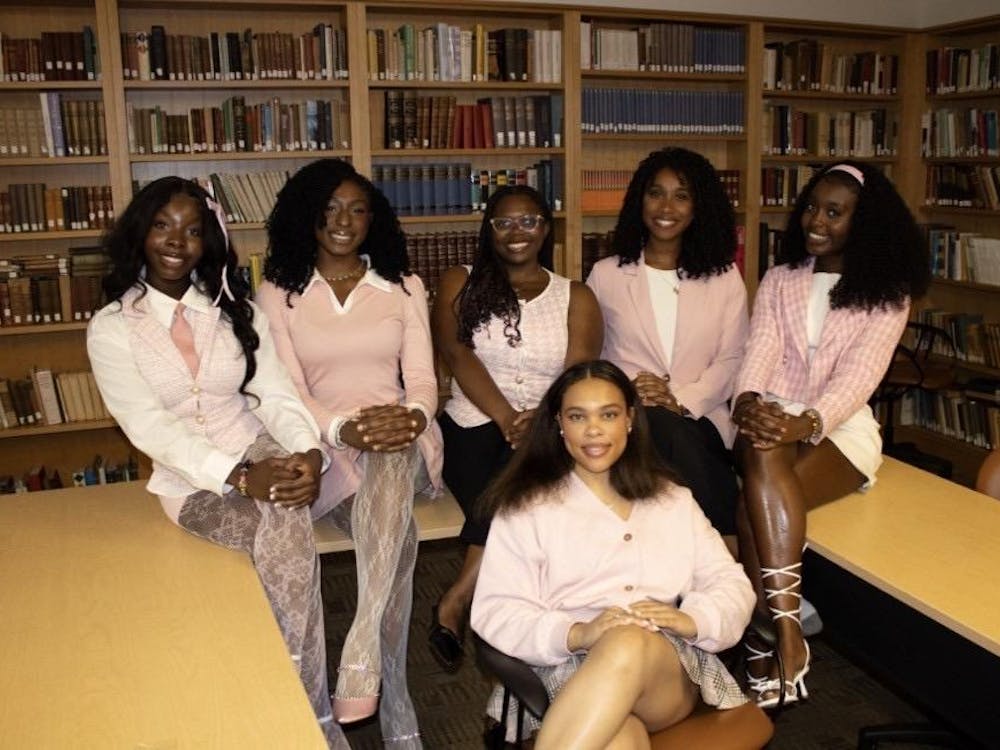Although the purple monkey may have been cute and cuddly, first-year Nursing student Arianna Garcia could not figure out how to remove the obnoxious creature from her computer screen.
"I was downloading stuff, and this little monkey came up," Garcia said. "I downloaded him, and he kept popping up and talking to me."
Fortunately, Shoa Tavassoli, the first-year computer adviser in Hancock, was available to rescue Garcia from this annoying primate.
"It turned out she had downloaded 'bonzi-monkey' or something and it had files all over the place," Tavassoli said. "We found and deleted the files, and the monkey waved bye-bye and went away, no kidding."
First-year CAs are trained to help students with simple and more complicated computer problems. The CAs work about five hours each week and receive $500 per semester. The Computing Adviser Program falls under the umbrella of Computing Support Services, a division of Information Technology and Communication.
The CA program began in 1997 when one CA was assigned to every two residence halls. By 2000, there were CAs in every dorm, and two senior CAs were assigned to program planning and mentoring new advisers.
"The new first-year students are our target audience, but we would like to have a computing adviser in [all University housing]," said ITC student services manager Janet Belew.
This program assigns one adviser to each of the first-year residence halls. The advisers then assist students with any computing difficulties. In addition to dealing with these difficulties, the CA program is always looking for suggestions.
"We are always trying to evaluate the program through feedback from the CAs," Belew said. "We are trying to develop a way for students to give us feedback on the service they are receiving from the CAs."
First-year College student Casey Bannister, the CA in Watson, found out about this job opportunity from a flyer sent in a packet from ITC.
"I've been interested in [computers] since I was a kid, but I didn't do anything formal until this past summer when I did an internship at Cornerstone, an Internet service provider," Bannister said. "I've started to be interested in networking, systems and Web design."
Bannister decided to fill out the online application over the summer, and later, he had an interview with Belew.
Although Bannister enjoys working with computers, he said, "this is more of a college job."
CAs, such as Bannister, were notified in early August that they were hired. The CAs competed against other applicants from their assigned dorms. They were selected based on experience, course work, reason for wanting to be a CA, references and people skills. They arrived on Grounds two days early for training.
"The first day was mostly about being helpful and friendly, and there was also about an hour of Mulberry setup," Tavassoli said about the new e-mail system.
Because upgrades and support cannot be offered for Simeon, Mulberry has replaced Simeon as the e-mail program offered by the University. All first years have Mulberry installed on their computers, and Simeon will be supported at the University at least through the summer of 2002.
"The second day's training was about security, how to identify DCI machines, Cavalier computers, and we had a tour of the labs," Tavassoli said.
The CAs will continue training through a class every Wednesday for the next few months. In the training session Sept. 5, they learned about the inventory they are responsible for taking. The CAs have a spreadsheet of everyone in their residence halls, and they do an inventory off all the computing equipment that students bring to school. This information is used to help ITC make decisions regarding technology at the University.
"We are trying to see how many students are bringing technology," Belew said. "The second thing we try to capture is desktop versus laptop. The third thing we try to capture is the operating system they are using. Then we try to figure out how they are hooked up to the network, and then we determine their network connectivity."
Although the CAs were briefed on what to expect on move-in day, many were not prepared for the chaos. The CAs were required to wear peacock blue ITC shirts with a design resembling a peacock on the back. The shirt was originally just peacock blue; the peacock design, however, was added after people nicknamed the CAs "peacocks."
"The shirt was bright blue, very blue, but people noticed me," Bannister said as he examined the shirt he held out in front of him.
"I can tell you that I now have a passionate hatred for the blue shirt we had to wear that day," Tavassoli said.
In addition to the blue shirts, CAs were also frustrated by incompetent parents.
"There were lots of old sweaty dads trying to hook up computers," said Eric Malpeli, a first-year College student and CA in Bonnycastle, as he recalled his experience on move-in day. "They knew enough to get themselves into trouble and not enough to fix any of the problems that arose."
On move-in day, the most common problems that the computer advisers dealt with involved Hewlett Packard printers. They also worked to fix malfunctioning printers.
"There is one printer that says there is no paper when it is full of paper," Malpeli said, shrugging his shoulders.
Although computer problems can be frustrating, the CAs ultimately help students learn how to fix the problems.
"An aspect of the job I really like is that we're told not to take over the computer but to instruct people," Tavassoli said. "I like that because that's how others can learn too."
First-year College student Shannon Jeffries knows all too well - she has called her CA several times to ask for computer advice from her room in Bonnycastle.
"My computer wasn't working at all, and Eric made it work," Jeffries said. "I've had multiple problems, and he's helped me every time ... I see him running up and down the halls helping other people too."
Sitting in front of the computer screen, focusing on Malpeli's instructions, first-year Engineering student Nithya Janakiraman said, "Eric is really, really helpful. He has certain office times, but he always works outside of those."
So the peacocks, on top of being students like everyone else, are expected to be computer experts after only a few days at college.
"It is a rewarding job, stressful at times, but I like being able to help people understand something about their computer that they didn't know before," Bannister said. "Even if it is something simple"






